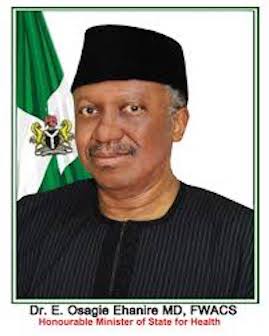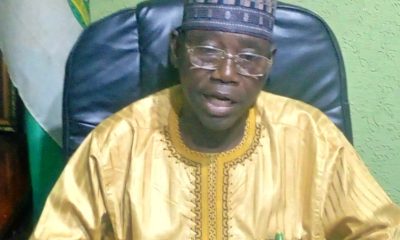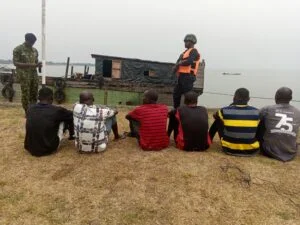Health
New Equipment Boost Services at Sokoto Neuropsychiatric Hospital

From Haruna Aliyu Usman,Birnin Kebbi
The Medical Director incharge of Federal Neuropsychiatric Hospital Kware, Sokoto State, Dr. Shehu Sale has applauded the Sokoto State Governor Rt Hon. Aminu Waziri Tambuwa, Minister of State for Health, Senator Olorunimbe Mamora, Former Governor of the sate, Senator Aliyu Wamakko and other philanthropists for their support and assistance to the Hospital.
He said the suport has made the hospital, the best among the other neuropsychiatric Hospitals across the country.
He stated this Friday, while fielding questions from DAILY ASSET in his office, adding that the hospital has been upgraded to the high standards through the support of the Federal Ministry of Health, Sokoto State Governor and other individuals.
“you see before i took over, the services were very scanty but within the last three (3) and half years we have improved greatly and remarkably. We were able to computerize our finance system in the accounts and this is very important because it minimised wastage and other sharp practices in the account” he added.
Dr. Sale, also pointed out that the Hospital Management had received a lot of donations from the state government under the leadership of Aminu Waziri Tambuwal, adding that it also received a lot of donations from other individuals such as vehicles and ambulances, medical equipment.
He said the donations were all geared towards establishment of family medicine clinic, that is NHIS clinic so that the hospital will in addition to psychiatric services, provide other services that are rendered by other specialists.
The MD who also emphasised on the achievements recorded within short time in the office pointed out that the hospital now had the equipment that were needed to provide psychiatric services mainly electro convulsive therapy (ECT)machine and also acquired electroencephalography (EEG) machines and others needed for its services.
“In addition, for family clinic, they also have all the equipment required in a standard operation theatre. Other equipment for our diagnostic centre such as ultrasound scan machine, X- ray machine and computerized Tomography Scan (CT- Scan) machine are all on their way.”he said.
He added further that all necessary arrangements had been concluded by the Federal Government through the Federal Ministry of Health for the purchase of a CT – Scan machine for the hospital.
“we have been getting tremendous support from the ministry. They have renovated the buildings, as well as the equipment, such as ambulance and we have the personnel to provide the services. I am only waiting for the management approval to establish the tester services but all that is needed to establish the services are available” he added.
Dr.Sale recalled explained that the Hospital was once a state -owned hospital which was later taken over in 1988 by the Federal Government.
He said that the mandate of the hospital was the same with other serving Federal Psychiatric Hospitals in the country.
“There are eight of them, two in north-west, one in Kaduna and the other in Sokoto. The main mandate of the hospitals are for provision of mental health care services, research and training of health care providers and all these mandates have been carried out effectively by the hospital” he said.
“When I took over the leadership of this hospital in June 2017, the staff strength was very small about five hundred 500 and now we have about seven hundred 700 staff strength within this three years and mainly the staff strength that was increased was in the areas of critical services that is nurses, pharmacists and medical doctors and also medical laboratory scientists. They were very few of these areas and these are the main professionals that are needed in the hospital.
“We also have the other ones but these are the ones that provide the much needed services in any health institution. So we have a number of them and we still need more but the number we have now is quite adequate” he added.
Health
Millions of Children Experience Daily Domestic Violence in Schools, Homes Globally – WHO
Hundreds of millions of children and adolescents around the world face daily violence in their homes, schools, and elsewhere which could have lifelong consequences.The World Health Organisation (WHO) said this on Thursday.The violence includes being hit by family members, being bullied at school, as well as physical, emotional, and sexual violence, WHO said.
In most cases, violence occurs behind closed doors. More than half of those aged two to 17 or more than a billion minors in total experience violence each year according to the WHO. In three out of five children and adolescents, it is physical violence at home, with one in five girls and one in seven boys experiencing sexual violence.Between a quarter and half of minors are affected by bullying according to the information provided.Only half of the children reportedly talk about their experiences of violence and less than 10 per cent receive help.Lifelong consequences could include depression and anxiety disorders, or tobacco and drug use.As a result, many children do not reach their learning potential in school.Against the backdrop of being highly preventable, violence remains a horrific day-to-day reality for millions of children around the world leaving scars that span generations,” said Tedros Adhanom Ghebreyesus, WHO director general.The UN’s first conference on violence against children opened in Bogota, Columbia on Thursday.At the two-day conference, more than 100 countries pledged to find ways to better support overwhelmed parents and introduce school programmes against bullying and for healthy social behaviour.They also pledged to raise the minimum age for marriage.Some countries wish to generally ban children from being hit at school or home. (dpa/NAN)Health
WHO Identifies 17 Pathogens as Top Priorities for new Vaccine Development

The World Health Organisation (WHO) has listed 17 bacteria, viruses and parasites that regularly cause disease as top priorities for new vaccine development.WHO, in a study published on Tuesday, reconfirmed long-standing priorities for vaccine research and development (R&D), including for HIV, malaria, and tuberculosis – three diseases that collectively take nearly 2.
5 million lives yearly. The study is the first global effort to systematically prioritise endemic pathogens based on their regional and global health impact. Attention is also given to pathogens such as Group A streptococcus, which causes severe infections and contributes to 280,000 deaths from rheumatic heart disease, mainly in lower-income countries.Another new priority is Klebsiella pneumoniae — a bacteria that was associated with 790,000 deaths in 2019 and is responsible for 40 per cent of neonatal deaths due to blood infection (sepsis) in low-income countries.The new study supports the goal of ensuring that everyone, everywhere, can benefit from vaccines that protect against serious diseases.It aims to shift the focus in vaccine development away from commercial returns towards regional and global health needs, WHO’s Dr Mateusz Hasso-Agopsowicz, who works in vaccine research, said in a statement.He explained that in the past, vaccine R&D typically was influenced by profitability.“As a result, diseases that severely affect low-income regions received little attention.“We hope this represents a critical shift where we want to change the focus from commercial perspective profitability of new vaccines towards the actual health burden so that the new vaccine research and development is driven by health burden and not just commercial opportunities,” he said.To carry out the study, WHO asked international and regional experts what they think is important when prioritising pathogens for vaccines R&D.Criteria included deaths, disease and socioeconomic impact, or antimicrobial resistance.“We had asked experts that have expertise in pathogen epidemiology, clinicians, paediatricians, vaccine experts from all of the WHO regions, to ensure that the list and the results that we produce really reflect the needs of diverse populations worldwide,” Hasso-Agopsowicz said.Analysis of those preferences, combined with regional data for each pathogen, resulted in the top 10 priority pathogens for each of WHO’s six regions globally.The regional lists were then consolidated to form the global list, resulting in the 17 priority endemic pathogens for which new vaccines are urgently needed.To advance vaccine R&D, WHO has categorised each pathogen based on the stage of vaccine development and the technical challenges involved in creating effective vaccines.Hasso-Agopsowicz said the study is expected to guide future vaccine R&D investments, including funders, researchers and vaccine developers, and also policymakers as they “can decide whether to introduce these vaccines into immunisation programmes.” (NAN)Health
UCH JOHESU Suspends Strike

The Joint Health Sector Unions (JOHESU), University College Hospital (UCH), Ibadan,has suspended the strike it embarked on Oct. 25.The workers resumed work on Friday morning.The seven-day nationwide warning industrial action embarked upon by the unions was to press home their demands ofadjustment of Consolidated Health Salary Structure as was done with the Consolidated Medical Salary Structure sinceJan.
2, 2014 and implementation of consultant cadre for pharmacists in federal health institutions. Others are upward review in the retirement age from 60 to 65 years for health workers and 70 years for consultants, andpayment of outstanding salaries of JOHESU members in professional regulatory councils.The UCH JOHESU Chairman, Mr Oladayo Olabampe, said that the strike was suspended as directed by the national body.He explained that “the suspension followed an MoU signed between JOHESU national leadership and Federal Government.“The Federal Government asked for a maximum of six weeks counting from Oct. 31, to meet our demands.“Based on the MoU signed, the JOHESU National Executive Council met and resolved that the strike be suspended on Fridaynationwide.”According to him, JOHESU UCH is obeying the order, and workers have resumed work.Olabampe said that if the demands were not met after the six weeks, they would embark on an indefinite strike. (NAN)


























